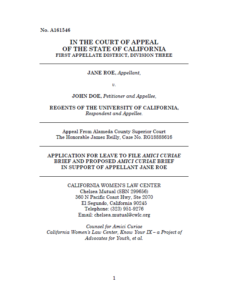Abortion rights, women of color, and LGBTQIA+ people are under attack. Pledge to join us in fighting for gender justice.
 On October 14, 2021, NWLC joined an amicus brief led by the California Women’s Law Center and Know Your IX, to a California Court of Appeal in support of a student survivor Jane Roe in Jane Roe v. John Doe and Regents of the University of California. This case arose when the University of California’s (UC) Title IX office found John responsible for sexually assaulting Jane and imposed a three-year suspension on John. During his suspension and while Jane was still a student on campus, John filed a writ petition challenging the UC’s Title IX decision, and a California state court vacated the UC’s decision, based in part on its conclusion that Jane’s credibility was a “significant issue” in the UC’s investigation. However, Jane was never notified of the writ petition and, as a result, was not given an opportunity to defend her credibility to the court. Jane, who is represented by Equal Rights Advocates, Public Counsel, and Steptoe & Johnson, LLP, then appealed the state court’s decision.
On October 14, 2021, NWLC joined an amicus brief led by the California Women’s Law Center and Know Your IX, to a California Court of Appeal in support of a student survivor Jane Roe in Jane Roe v. John Doe and Regents of the University of California. This case arose when the University of California’s (UC) Title IX office found John responsible for sexually assaulting Jane and imposed a three-year suspension on John. During his suspension and while Jane was still a student on campus, John filed a writ petition challenging the UC’s Title IX decision, and a California state court vacated the UC’s decision, based in part on its conclusion that Jane’s credibility was a “significant issue” in the UC’s investigation. However, Jane was never notified of the writ petition and, as a result, was not given an opportunity to defend her credibility to the court. Jane, who is represented by Equal Rights Advocates, Public Counsel, and Steptoe & Johnson, LLP, then appealed the state court’s decision.
The amicus brief explains that when a student who has been found responsible by their school for sex-based misconduct asks a court to overturn their school’s decision, the survivor is a “real party in interest” and therefore has a due process right to be notified so that they have the option of participating in the court proceedings. This right of parties in sexual misconduct investigations to be notified of any changes to their school’s decision is already recognized by federal and California state law, as well as UC’s sexual misconduct policy. Also, survivors have strong reputational, emotional, and psychological interests in not being wrongly labeled as someone who lied about sexual assault and in not being forced to share a campus with their harasser or abuser. When courts overturn a school’s disciplinary decision without notice to the survivor, this can have a devastating effect on the survivor’s academic, career, and social success. Finally, the brief explains that schools are not an appropriate proxy for survivors’ interests in such court proceedings, as schools have a range of different interests. They are typically incentivized to pursue rushed investigations and, ultimately, avoid legal liability, which often involves refuting allegations of violating survivors’ civil rights. Survivors like Jane Roe already face attempts to silence them from their harassers and often from their schools; courts must not attempt to silence survivors yet again by excluding them from court proceedings that would not even have arisen without the survivor’s courage to come forward in the first place.
